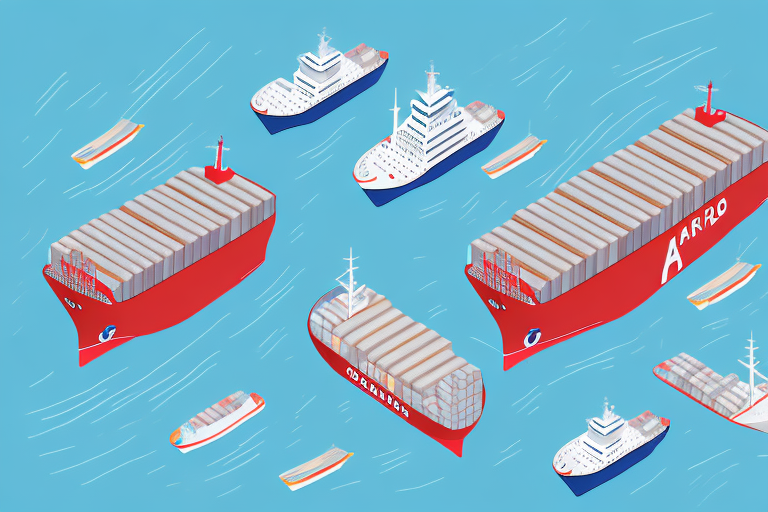Understanding the Benefits of Cargo Insurance for Supply Chain Management
If you are operating in the supply chain industry, you must be aware of the risks and uncertainties that come along with it. One of the most significant risks is the potential damage or loss of cargo during transit. This can result in financial loss, delays, and damage to your reputation. To mitigate these risks, cargo insurance is an essential investment for any business involved in supply chain management.
Why Cargo Insurance is Crucial for Supply Chain Management
The supply chain industry is subject to a range of risks that are beyond the control of any business owner. Cargo theft, natural disasters, and damage during transit are some of the common events that can cause significant financial damage to your business. According to the Transportation Security Administration, cargo theft alone costs the industry billions annually. Cargo insurance is a form of protection that provides coverage for any financial loss resulting from such events.
Moreover, cargo insurance also helps in mitigating the risks associated with international trade. When goods are transported across borders, they are subject to different laws and regulations. Cargo insurance can help you navigate these complexities and ensure that your goods are protected throughout the journey. Additionally, cargo insurance can also provide coverage for any legal liabilities that may arise due to damage or loss of goods during transit.
What is Cargo Insurance and How Does it Work?
Cargo insurance is a type of insurance policy specifically designed to protect cargo during transit. It offers coverage for loss or damage to goods during loading, transit, and unloading. The policy typically covers the cost of the goods, any freight charges paid, and other expenses associated with the shipment.
When you purchase cargo insurance, you pay a premium to an insurance company. In return, the insurance company assumes the risk of financial loss associated with cargo damage or loss during transit. If an insured event occurs, you can file a claim with the insurance company, and they will cover the cost of the loss up to the limit of the policy's coverage.
It is important to note that cargo insurance policies can vary in coverage and exclusions. Some policies may exclude certain types of cargo or only cover specific modes of transportation. It is crucial to carefully review the policy and understand the terms and conditions before purchasing cargo insurance. Additionally, it is recommended to work with an experienced insurance broker who can help you navigate the complexities of cargo insurance and find the right policy for your specific needs.
The Risks of Not Having Cargo Insurance in Supply Chain Management
If you are not adequately insured, the risks of financial loss associated with cargo damage and loss can be significant. Without cargo insurance, you are solely responsible for any loss incurred, which can result in substantial financial damages. In addition to the financial costs, delays arising from unforeseen events can also lead to damage to your business's reputation.
Another risk of not having cargo insurance is the potential legal liabilities that may arise. If your cargo causes damage to other people's property or injures someone, you may be held liable for the damages. This can result in costly legal fees and settlements, which can be financially devastating for your business.
Furthermore, not having cargo insurance can also lead to difficulties in securing financing or partnerships with other businesses. Many lenders and partners require proof of insurance before entering into any agreements, and without it, you may be seen as a higher risk and a less desirable partner.
Different Types of Cargo Insurance Available in the Market
There are various types of cargo insurance policies available, depending on the type of goods being shipped, the mode of transportation, and other factors. Some of the common types of cargo insurance include:
- All-risk cargo insurance
- Named peril insurance
- Valuation coverage
- Warehouse to warehouse coverage
All-risk cargo insurance is the most comprehensive type of coverage available. It covers all risks of physical loss or damage to the cargo, except for those specifically excluded in the policy. This type of insurance is ideal for high-value goods or goods that are being transported over long distances.
Named peril insurance, on the other hand, only covers specific risks that are named in the policy. This type of insurance is less expensive than all-risk cargo insurance but provides less coverage. It is suitable for goods that are being transported over shorter distances or for goods that are less valuable.
How to Choose the Right Cargo Insurance for Your Business
Choosing the right cargo insurance policy for your business requires careful consideration of several factors. To make an informed decision, you need to determine the level of coverage you require, the type of goods you are shipping, the mode of transportation, and other relevant factors. Consulting with an experienced insurance agent can help you make the right choice.
It is also important to consider the reputation and financial stability of the insurance provider. You want to ensure that the company you choose has a strong track record of paying claims and providing excellent customer service. Additionally, you should review the policy details carefully to understand any exclusions or limitations that may impact your coverage. By taking the time to research and compare different options, you can find the cargo insurance policy that best meets the needs of your business.
How Does Cargo Insurance Protect Your Business from Financial Loss?
Cargo insurance provides protection to your business from financial loss resulting from cargo damage or loss during transit. Having adequate cargo insurance coverage can help to minimize the financial impact of unforeseen events, such as natural disasters, theft, or accidents during transit. According to the Insurance Journal, businesses that invest in cargo insurance recover more quickly from disruptions, maintaining operational continuity.
Additionally, cargo insurance can also provide coverage for any legal liabilities that may arise during the transportation of goods. This can include damage to third-party property or injury to third-party individuals. Without proper coverage, your business could be held liable for these damages, which could result in significant financial loss.
Furthermore, cargo insurance can also help to protect your business's reputation. If your cargo is lost or damaged during transit, it could result in delays or cancellations of orders, which could lead to dissatisfied customers and a damaged reputation. With cargo insurance, you can ensure that your business is protected from these potential consequences and maintain a positive reputation in the industry.
The Cost of Cargo Insurance vs the Cost of Losing Your Goods
The cost of purchasing cargo insurance can vary based on several factors, such as the type of goods being shipped, the mode of transportation, the level of coverage required, and other relevant factors. However, the cost of purchasing cargo insurance is typically much lower than the financial cost of cargo damage or loss during transit. For instance, according to a report by Business Insurance, the average cost of cargo insurance is approximately 0.5% of the total cargo value.
Investing in cargo insurance can provide peace of mind and protect your business from significant financial loss.
Top Factors to Consider When Purchasing Cargo Insurance for Your Supply Chain
When purchasing cargo insurance for your supply chain, several factors must be considered. Some of the top factors to consider include:
- The value of the goods being shipped
- The mode of transportation
- The destinations the goods will be shipped to
- The level of coverage required
- The reputation and experience of the insurance provider
Another important factor to consider when purchasing cargo insurance is the type of goods being shipped. Some goods may be more susceptible to damage or theft during transportation and may require additional coverage or specialized insurance policies. It is important to carefully evaluate the specific risks associated with the goods being shipped and ensure that the insurance policy provides adequate coverage.
In addition, it is important to consider the potential impact of supply chain disruptions on your business. While cargo insurance can provide financial protection in the event of loss or damage to goods, it may not cover the costs associated with delays or disruptions to your supply chain. To mitigate these risks, it may be necessary to invest in additional insurance policies or contingency plans to ensure that your business can continue to operate in the event of unexpected disruptions.
What Are the Legal Requirements for Cargo Insurance in Supply Chain Management?
In many countries, cargo insurance is a legal requirement for businesses engaged in international trade. Specific legal requirements can vary depending on the destination country, mode of transportation, and other factors. For detailed legal requirements, refer to the U.S. Customs and Border Protection guidelines. Failure to meet these legal requirements can result in significant financial and legal consequences.
Understanding the Claims Process for Cargo Insurance
If you need to file a claim with your cargo insurance provider, it is essential to understand the steps involved in the claims process. The process typically involves submitting documentation and evidence to support your claim, such as a bill of lading, commercial invoice, and proof of damage. Your insurance provider will assess the claim and, if approved, will provide you with compensation based on the policy's coverage.
The Role of Freight Forwarders in Obtaining and Managing Cargo Insurance
Freight forwarders can play a crucial role in obtaining and managing cargo insurance for your supply chain. They have the expertise and experience required to determine the appropriate level of coverage and ensure that the insurance policy meets legal requirements. Additionally, freight forwarders can help you manage the claims process and ensure that you receive compensation in the event of financial loss.
How to File a Claim with Your Cargo Insurance Provider
If you need to file a claim with your cargo insurance provider, you should follow the specific process outlined in your policy. The process typically involves providing documentation and evidence to support your claim, such as a bill of lading, commercial invoice, and proof of damage. Your insurance provider will assess the claim and, if approved, will provide compensation based on the policy's coverage.
Common Misconceptions About Cargo Insurance and Supply Chain Management
There are several common misconceptions regarding cargo insurance and supply chain management. One of the most significant misconceptions is the belief that freight forwarders are responsible for insuring goods during transit. Another misconception is that cargo insurance is not necessary if the goods are shipped domestically. It is essential to educate yourself and rely on reliable sources to make informed decisions regarding your cargo insurance needs.
The Future of Cargo Insurance and Its Impact on Supply Chain Management
Cargo insurance is likely to continue being an essential aspect of supply chain management in the future. As the global economy becomes increasingly interconnected, businesses will need to ensure that their goods are protected during transit. Additionally, advancements in technology and data analytics will enable insurance providers to offer more customized and sophisticated coverage options that better meet the needs of businesses involved in supply chain management.
In conclusion, cargo insurance is a crucial investment for any business involved in supply chain management. It provides protection against the financial loss resulting from cargo damage or loss during transit. By understanding the benefits of cargo insurance and the factors to consider when purchasing a policy, businesses can safeguard their goods, protect their reputation, and effectively mitigate risks.






















